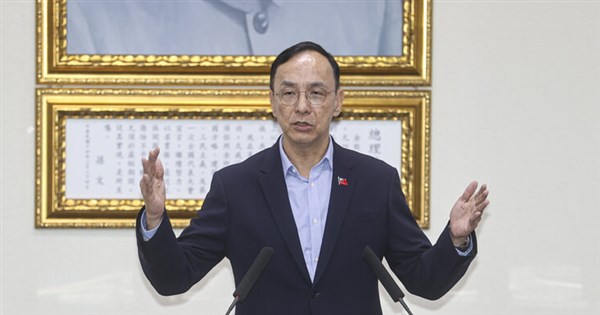Taipei, April 9 (CNA) Taiwan’s current economic challenges are not limited to the imposition of U.S. tariffs, but also extend to American pressure on defense spending and currency valuation, as well as risks from holding too much U.S. debt, opposition Kuomintang (KMT) Chairman Eric Chu (朱立倫) said Wednesday.
Speaking at a meeting of the KMT’s Central Committee, Chu said that April 9 — when individualized steep U.S. tariffs on its trading partners took effect — effectively represented “the death knell of global free trade.”
“The era of globalization is over, and it is being replaced by the rise of protectionism,” Chu said.
Chu noted that during his campaign and since taking office, U.S. President Donald Trump has frequently spoken of his plans to impose tariffs and demanded other countries increase their defense spending.
On the former, Taiwan was slapped with a 32 percent tariff, despite major investments in the U.S. by TSMC, moves to increase its national defense funding, and plans to increase purchases of American goods, Chu said.
As for national defense, Trump has promised US$1 trillion in defense spending in 2025, equivalent to 3.5 percent of U.S. GDP, and Taiwan may face pressure to reach similar spending levels, Chu said.
Beyond these, Chu said, there is also the issue of currency valuation.
“Taiwan will face strong demands [from the U.S.] to allow the Taiwan dollar to rise, which will deal a heavy blow to export-oriented industries,” Chu said, adding that the government must be prepared to respond.
► Exports up for 16th straight month in February with U.S. as No. 1 buyer (March 8)
► Taiwan becomes 7th largest U.S. trading partner in 2024 (March 9)
Meanwhile, Chu also pointed out risks connected to Taiwan’s holdings of U.S. debt, which comprise 92 percent of the country’s US$577 billion in foreign exchange reserves.
“How much of this will Taiwan be able to redeem?” he asked.
Chu said the NT$88 billion special budget proposed by the government this week to mitigate the impact of the U.S. tariffs and broader financial uncertainty was “only a drop in the bucket” of what is needed.
In addition to industry, the impact on labor and the consumer market also needs to be addressed by the special budget, Chu said, adding that the KMT would propose spending at least NT$200 billion.
More broadly, Chu argued that as an export-oriented country, the Republic of China (Taiwan) cannot make itself completely reliant on the United States, and should instead learn from the example of Singapore.
Only by not neglecting any markets can Taiwan get itself on a new road to prosperity, Chu said.
